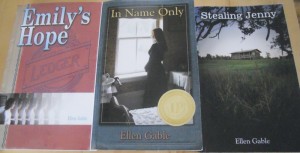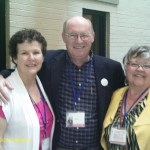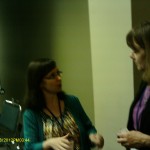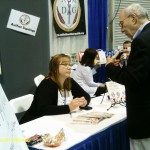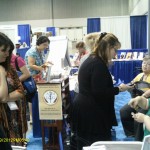Why We Catholics “Pray” to Saints
In parishes throughout the country, the Litany of Saints is a regular feature at Mass throughout the month of November, at Baptisms, and at other important times in the Liturgy. Just in time for those contentious arguments that crop up at the holidays, Larry Peterson tackled the thorny topic of ‘praying to saints’ on his personal blog, and shares his thoughts here as well.
First of all, let’s get something straight–Catholics DO NOT worship or adore saints. God alone is worshiped and adored. Period, Amen. So who are these people we call saints and why do we “pray” to them? Well, for starters, remember that praying is just like talking. When we pray to the saints we are talking to them. When we pray to God we are talking to God. However, there is a HUGE difference. When you talk to God it is direct, one on one, straight up. You cannot go any higher. God is the top Man. The “buck stops with Him”. Many Christians feel that there can be no intercessor between “God and man (when I use the word man I also mean woman, okay?) except God Himself. Well, that is fine and perfectly okay. All of us Catholics always talk directly to God too. So, what about these people called saints? (I know, I know, we Catholics sure can be weird.)
Here is how yours truly looks at this saint situation. I have to compare it to baseball or football. Over the years many thousands of men (and even some women) have played baseball and football. Heck, when I was a kid we were playing stick-ball in the streets of the Bronx when we were seven years old. I guess I could safely say that millions of people have played the game over the years. The years go by and we begin to grow up and most of us fall by the wayside as far as being great football or baseball players. But there are those select few that continue to play and actually become professionals. And from that group the cream comes to the top, the “best of the best” the greatest of them all, the ones that break records and become heroes to young and old alike.
These people we pedestalize and place them in a place called the “Hall of Fame”. Babe Ruth, Mickey Mantle, Willie Mays, Sandy Koufax and Jimmy Brown and Terry Bradshaw and Joe Namath and the list goes on. Immortalized forever because they were the best of the best. Well, there you have it. The Saints are the “Catholic Hall Of Fame”. They are the best of the best, the ones that loved their faith so much many died for it. There are the ones who spent their entire lives living in poverty and working with the sick and the poor, never wanting anything for themselves and always having a smile on their face because they never lost sight of the prize. They showed us how the game of life should be played.
Here’s the deal. We know that these folks died and went to Heaven. They are with God. This is a faith thing so don’t get logical about it. Imagine if you had a big brother or a big sister and you needed something from your dad but you were sure he would say “no” so you decide to ask your big brother to put in a good word for you. And he does and Dad agrees. And there it is. We ask the saints to put in a good word for us because they are with God and they “have His ear” so to speak. No, I cannot prove it. Once again, it is a faith thing. But I do believe it, without reservation.
You know, we all have pictures of our family members in our homes or wallets and we have statues of great people in history. Why? We honor them. Same with the saints. And for all those who did not make it into the Hall of Fame we talk to them too. You see, we are all one, big family known as the “communion of saints”. That’s right, you don’t even have to be dead to be a saint. It is a beautiful thing.

